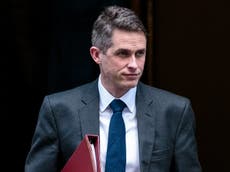By sacking Williamson, Theresa May shows she’s going to go out fighting
The main message from the prime minister is that she’s not going quietly. Her Brexit policy is in ruins, but with the demented optimism of the kind of personality that makes it to the top, she still thinks she can turn things around

Theresa May’s time as prime minister is coming to an end, and cabinet discipline is breaking down. The Huawei leak and the recriminations over it felt like the last days of a crumbling administration, but even the most wounded prime minister still has some power. She has used it ruthlessly.
In constitutional theory, a prime minister has no power except that to hire and fire ministers and to chair meetings. But the hire and fire power is still to be feared. Gavin Williamson may continue to protest his innocence, but the prime minister has the authority.
She has used it to do several things at once. First, discipline is sharply restored. Williamson’s sacking won’t prevent the leadership jockeying and briefing against colleagues that is part of normal politics, but it will make ministers think twice about pushing their luck.
Second, by promoting Penny Mordaunt as the first female defence secretary May has stamped her personality on the government, with a reshuffle in her image, as someone who has long advocated more women in positions of power.
Her appointment of Rory Stewart to replace Mordaunt at international development also rewards an intense loyalist who is a good communicator.
Third, May has restored a sense of grip to the Whitehall machine. The leak of the decision of ministers to allow Huawei to build non-core parts of the 5G mobile phone network was not a serious threat to national security, but the principle of confidentiality matters greatly to the civil service.
Since the leak there has been much comment about how leak enquiries rarely find the culprit, and that they often simply go through the motions of investigation. But this one was serious and Mark Sedwill, the cabinet secretary, was obviously confident enough in his “compelling evidence” that Williamson was responsible that the prime minister acted.
It shows how important the National Security Council has become. It was set up by David Cameron, but has quickly become part of the government machine – although there had been grumbles recently from the civil service that its meetings haven’t been as regular as they should have been.
The main message from the prime minister in this reshuffle is that she’s not going quietly. Her Brexit policy is in ruins, but, with the demented optimism of the kind of personality that makes it to the top, she still thinks she can turn things around.
It was evident from her grip at the Liaison Committee, where she gave evidence to MPs for an hour and a half, that she is serious about negotiating a Brexit deal with Labour. This is never going to work, but she is going to keep trying.
In the unlikely event that it succeeds, and we leave the EU, she’ll be off, her place in history secured. But in all other historical paths ahead of her, where we stay in the EU for the foreseeable future, she is not going to give up her job easily.
By sacking Williamson and promoting her supporters she has sent the clearest message that she is going to go out fighting every inch of the way.




Join our commenting forum
Join thought-provoking conversations, follow other Independent readers and see their replies